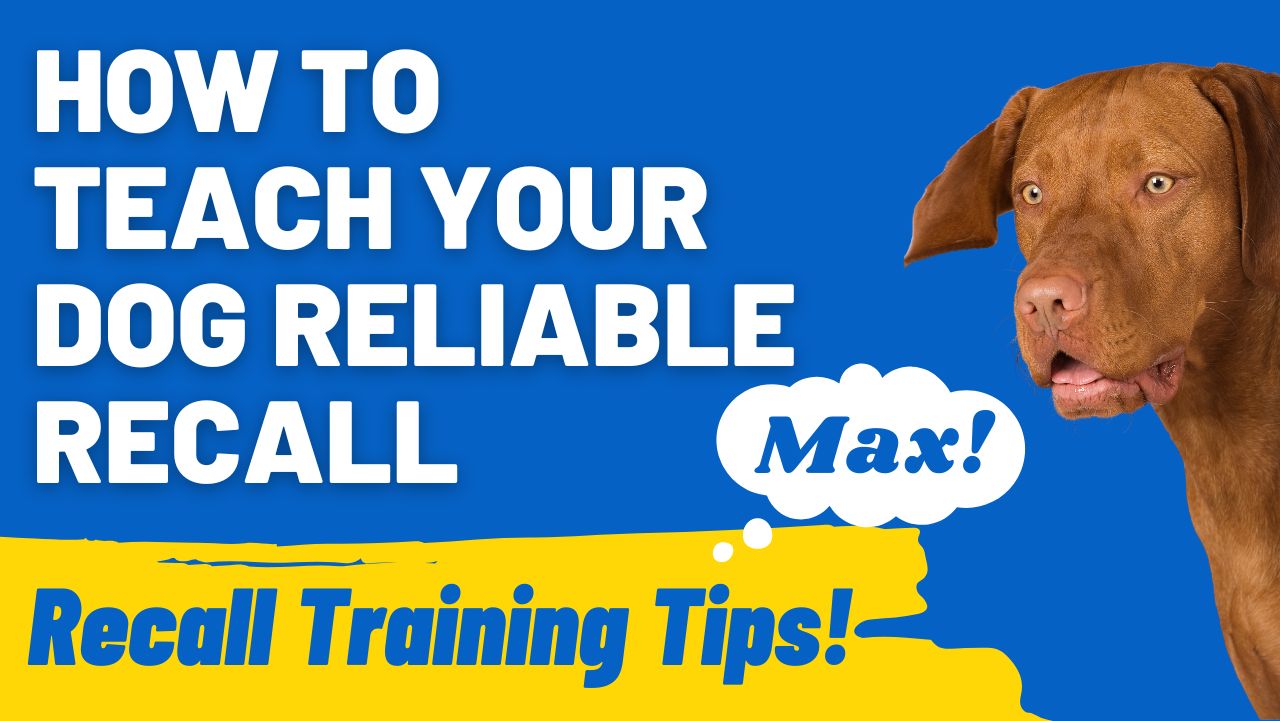Teaching a dog recall is not just a basic obedience skill; it’s a vital aspect of ensuring the safety and freedom of your beloved pet.
Picture this: your dog is playfully chasing after a squirrel or suddenly finds itself in a potentially dangerous situation.
In moments like these, a well-taught recall command can be a lifesaver, compelling your dog to return to you immediately, regardless of distractions. This key skill helps to avert potential accidents or unwanted encounters with other animals.
Furthermore, learning how to teach a dog recall is about striking the right balance between freedom and safety.
Ultimately, mastering recall training with your dog harmonizes safety, freedom, and reinforces the bond you share, making it an essential component of responsible dog ownership.
What is Recall Training in Dog Training?
Recall training, a cornerstone of canine obedience training, is the process of teaching your dog to come to you upon command.
It’s a fundamental aspect of dog behavior training that ensures your pet responds promptly and reliably when called.
This training is not just about teaching recall; it’s about instilling a reflexive response that your dog adheres to, regardless of distractions.
Beyond safety, recall training significantly contributes to the overall canine recall strategies aimed at enhancing a dog’s obedience skills.
How Does Your Dog’s Breed Affect Recall Training?
When it comes to recall training, one size does not fit all. Different dog breeds bring unique traits and temperaments to the training process, influencing how they respond to recall commands.
Understanding your dog’s breed-specific characteristics is key to tailoring effective recall training strategies.
For instance, breeds with a strong hunting instinct, like Beagles or Pointers, may be more prone to distractions due to their heightened sense of smell and innate curiosity. Training these breeds often requires extra patience and consistent reinforcement to combat their natural tendencies.
On the other hand, breeds known for their eagerness to please, such as Golden Retrievers or Labradors, may demonstrate quicker responses to recall training, as they naturally enjoy following commands and interacting with their owners.
Regardless of breed, understanding and working with your dog’s inherent instincts and behaviors is essential for successful canine obedience training and ensuring a reliable recall.
Basic Principles of Effective Recall Training

Mastering recall training with your dog hinges on three fundamental principles: positive reinforcement, consistency, and patience. Integrating these principles into your training regimen is vital for developing effective recall response training and enhancing your dog’s obedience skills.
Using Positive Reinforcement
This is central to recall training success. It involves rewarding your dog with treats, praise, or toys when they obey recall commands. This positive reinforcement increases the likelihood of your dog repeating the desired behavior.
For instance, giving a treat or a favorite toy immediately after your dog responds to a recall command reinforces this positive action.
Not only does this method make training enjoyable for the dog, but it also strengthens the bond between the dog and the owner.
It’s a foundational aspect of dog training techniques, making the learning experience both rewarding and enriching for the dog.
The Role of Consistency
Consistency is crucial in recall training. Regular and repeated training sessions are necessary for your dog to understand and memorize recall commands.
Consistency goes beyond the frequency of training; it also pertains to the uniformity of commands and rewards. Dogs benefit from a routine, which enhances their learning.
Practicing recall commands in diverse conditions and environments helps solidify your dog’s understanding and response to these cues.
Consistent training reinforces canine behavior training, ensuring that your dog reliably understands and follows the recall command.
Patience and Understanding Your Dog
Every dog is unique, and it’s important to understand their individual learning pace and signals. While some dogs may quickly grasp recall commands, others might need more time and repetition.
Patience is key in recall training, as it’s important to recognize and respect your dog’s learning curve. Adjusting your training methods to suit their pace and observing their body language and responses during training can provide insights into their comfort level and readiness to progress.
Patience, combined with a deep understanding of your dog’s behavior, ensures a more effective and stress-free training experience for both the dog and the owner.
Common Challenges in Recall Training and Solutions
Recall training can present a few hurdles, but understanding how to navigate these challenges is key to success. Two of the most common issues are distractions and behavioral challenges like stubbornness or fear.
- Dealing with Distractions: Distractions are a major hurdle in recall training. The key is to gradually introduce distractions in a controlled manner. Start in a quiet environment and slowly increase the level of distraction, allowing your dog to adapt and focus. Use positive reinforcement to reward attention and correct responses in the presence of distractions. Consistency in this approach will help your dog learn to respond to recall commands even in busy or stimulating environments.
- Addressing Stubbornness or Fear: Some dogs may exhibit stubbornness or fear during recall training. For stubborn dogs, it’s essential to make training sessions more engaging and rewarding to capture their interest. For fearful dogs, a gentle and patient approach is crucial. Understand their fears and slowly build confidence with consistent, positive reinforcement. Acknowledging and respecting your dog’s emotions will lead to better training outcomes.
Recall Training Progress Tracker
To effectively monitor your dog’s progress in recall training, maintaining a progress tracker can be extremely helpful. A simple table format works best, allowing you to record key metrics after each training session.
Here’s an example of the “Recall Training Progress Tracker” table, designed to help owners track their dog’s progress in recall training:
| Date | Environment | Response Time (Seconds) | Notes |
| 01/01/2024 | Backyard | 20 | Initial training, responsive |
| 01/04/2024 | Park | 18 | More distractions, good focus |
| 01/07/2024 | Beach | 25 | Struggled with water sounds |
| 01/10/2024 | Forest | 15 | Very attentive, no distractions |
| 01/13/2024 | City Street | 30 | Busy area, slower response |
Advanced Techniques: Enhancing Recall Skills
To further enhance your dog’s recall skills, incorporating advanced techniques is essential. These methods not only improve response times but also ensure your dog is prepared for a variety of situations.
Training your dog to respond to recall commands from greater distances is crucial, especially in open spaces or off-leash scenarios.
Begin by gradually increasing the distance between you and your dog during training sessions, ensuring each step is mastered before moving further away.
Use clear, consistent commands and reinforce each successful recall with rewards. This practice develops not only your dog’s listening skills but also their ability to respond despite physical separation.
In addition, emergency recall commands are designed for critical situations where immediate response is vital. These commands should be distinct from regular recall cues and practiced in a controlled environment initially.
Use a unique word or phrase and combine it with high-value rewards to differentiate it from everyday commands.
Regular practice, coupled with positive reinforcement, ensures your dog understands the urgency of these commands.
Recall Training Success Stories

Here’s the case of Bella, a Labrador who mastered recall commands within weeks.
Initially distracted by squirrels and other dogs, Bella’s owner used consistent training with positive reinforcement, eventually achieving a near-instantaneous response even in busy parks.
Another inspiring story is Max, a rescue dog with initial trust issues. Through patient and gradual training, Max’s owner was able to build trust and teach effective recall commands.
These success stories highlight the transformative power of dedicated recall training, showcasing significant improvements in both safety and dog-owner bonding.
Conclusion
Recall training is an invaluable journey that enhances both the safety and the bond between you and your dog. It’s a path that requires consistency, patience, and positive reinforcement.
Celebrate each milestone, no matter how small, as each step brings your dog closer to mastering reliable recall.
Remember, the time and effort invested in training not only improves obedience but also deepens the mutual trust and understanding between you and your canine companion.
Keep persisting with these training strategies, and you’ll create a lasting, responsive bond with your dog, ensuring their safety and your peace of mind in any environment.
Frequently Asked Questions
1. How long does it typically take to teach a dog reliable recall?
The time it takes to teach a dog reliable recall can vary depending on factors like the dog’s breed, age, temperament, and consistency of training. Generally, you can start seeing results within a few weeks, but it’s important to continue training and reinforcing the behavior over several months. Remember, patience and consistency are key to success in recall training.
2. Can older dogs still learn effective recall, or is it mainly for puppies?
Absolutely! Older dogs can still learn effective recall. While puppies might pick up new commands quicker due to their developmental stage, older dogs are just as capable of learning recall commands. The key is to tailor your training approach to suit their learning pace and to use positive reinforcement techniques consistently.
Ready to Elevate Your Dog’s Recall Training?
Take the first step towards a safer, more fulfilling outdoor experience with your furry friend. Visit HoundGames for innovative training aids and expert guidance. Your dog’s journey to impeccable recall starts with the right tools and support. Let HoundGames be your partner in crafting a stronger bond and a safer future for your beloved pet. Connect with us today!




